|
|
|||
[For the uninitiated, a 'blog' (or weblog) is a web journal with links. This gives me a chance to add short, 'off the record' style items that wouldn't merit a separate article. I try my best to keep entries informal, frequent, brief and (hopefully) interesting. For more information about Jamie Goode, see the about the author section. ] Sunday 22nd August 2004 For drinks? Tonight itís Fevre's basic Chablis 2002,
which is fantastic. Honest. Sainsbury, £8.99. To be followed by the
last third of Castelnau. Friday 20th August It's currently 11.46 pm, and I've allowed myself a short break from the book to blog. I'm currently drinking another bottle of the Castelnau de Suduiraut 2000, a fine Sauternes for very little money. It's got everything you want from a Sauternes. First, sweetness and acidity in tension: Sauternes can often be a little sweeter than Barsac, without the same cutting acidity, and as a result can feel a little cloying. This Castelnau could probably do with a touch more acidity, but the balance is pretty much OK. [Temperature affects the perception of sweetness, so if you have a slightly cloying Sauterne, serve it ice cold. I've heard reliable stories of wealthy wine collectors serving Yquem so cold that there's ice in the bottle.] Second, some botrytis - this is evidenced by the apricot/marmalade/spice characters. It adds complexity. Third, it has a lovely rich, rather viscous mouthfeel. I imagine Suduiraut were fairly rigorous in their selection in 2000, but this second wine is pretty smart at around £8 a bottle (75 cl). I bought three in France, and the last two will soon be gone, I suspect. Earlier on I opened a Vieille Cure Fronsac 1999, a recent purchase from Sainsbury, but it was disappointing. It tasted cooked. Heat damage in the UK wine chain will likely be an increasing problem if we have more summers like last year's. Sunday 15th August Saturday 14th August Iíve been concentrating on viticulture recently.
Interesting questions: what exactly is the difference between
varieties and cultivars in genetic terms? How does yield relate to
quality mechanistically? Is there a molecular link between light
signalling and the fate of uncommitted primordial? Do tendrils signal
to shoots when they actually grip round a support structure? Where are
the decent viticultural texts? (There donít seem to be manyÖ) Wednesday 11th August Monday 9th August Wednesday 4th August Oh,
the football was good on Monday night. Reading have a nice, compact
stadium. City won 4-1 with goals from Reyna (2), Macken and Sibierski.
Anelka looked sharp, as did Fowler in patches. Reyna and Bosvelt made
a good partnership in central midfield, and Wright-Phillips oozed
class. Monday 2nd August Tonight I'm taking my nippers to their first Man City game - a friendly against Reading. I'm hoping this will offset the evil influence of the Man UTD videos my mother bought for the eldest last week. I've been striking it lucky on the wine front over the last few days. Last night a bottle of the sensational Matassa 2002 (more on this later), plus a very enjoyable Gentil 2002 from Hugel, a brilliant and cheap Alsace white. The Steenberg Sauvignon Blanc 2003 and Ch la FessadiŤre Muscadet 2003 bought recently from Sainsbury also showed very well on a warm, white-winey weekend. Friday 30th July The latest Decanter popped through the doormat today. Panel
tasting of 2001 Crozes Hermitage and St Joseph. Two comments: first,
Decanterís scoring system is nuts. 14.47, 16.8, 12.33789? If you
have to score, why not use a 100 point scale? Have you ever seen a
wine being marketed as Ď16.7/20 Decanterí alongside Ď91 Parker,
97 WSí? I didnít think so. Secondly, where I know the wines, I
find some of their panel scores inexplicable. Of course, it may well
be that it is my palate that is deficient. One of my favourite
Northern RhŰne purchases in recent years was the Gilles Barges St
Joseph Les Martinets 2001. This came near the bottom in
Decanterís tasting, with 12.8/20. But itís a fantastic wine:
bloody, meaty and rich, and Iím really glad I still have half a
dozen bottles left. Does anyone out there find the Decanter panel
tastings to be a reliable purchasing guide? Does anyone use them to
steer their buying? It would be interesting to know. Sunday 25th July
My dear mother is a cause for concern at the moment. She bought our eldest son two football videos. Nothing wrong with that, you might think, and yes, he loves football. Obsessively. But these were Man UTD videos. What was she thinking of? How can I allow them in my house as a self-respecting blue? Does she realise the horrible position she has put me in? Did she do this deliberately? Was all that affection throughout my childhood and ongoing into my current post-adolescent (but only just) state a mere sham?
Thursday 22nd July We started off with white Burgundy and a range of Corton
Charlemagne Grand Crus from Ď98, Ď99 and 2000. A Bouchard
98 and Faively 99 were both very nice. There were also some
2000 1er Cru Puligny Montrachets from Olivier Lefliave that
impressed. On to the reds. Jaboulets Crozes Hermitage Thalabert
1990 is now at its drinking peak, and was evolved, spicy, and
earthy. Of a long list of Clarets, Figeac 86 is evolved and
drinking very well now in a savoury, earthy way. Pichon Longueville
Comtesse 2001 is a very successful wine with lovely structure and
a chocolatey edge to the fruit Ė thereís a hint of greenness but
itís the sort that will integrate well with the wine in time. Pichon
Baron 96 is now drinking well, or close to it, just having emerged
as structured and firm as anything from a long sleep. Mouton
Rothschild 96 is still asleep, all big and structured, but
potentially pretty good. Cos 97 is a bit thin and should be
drunk very soon. Some new world representation, although I seemed to
be the only punter interested: the Diamond Creek Volcanic Hills
1997 impressed, and the Stonyridge Larose 1999 was also
nice, in quite an old worldy sort of style. It was a well organized event, and Ficofi staff were
competent and professional. There was a good atmosphere, too: no sense
of intimidation for novices. In fact, most of the punters really were
novices. A lot of good wine was drunk rather unquestioningly, merely
for its alcoholic effect. Still, I suspect this is the fate of a
surprising number of the worldís great wines. Who knows? A few might
just have been bitten by the wine bug from slugging back these
relatively posh bottles. Finished off the evening in style with a quick dinner at one of my favourite places: Tendido Cero, a tapas joint on the Old Brompton Road. Dish after dish of close to perfect tapas, washed down with water, which is all we needed after a decent consumption of wine. It's a great restaurant: cash only and BYO, if you are planning to visit. Monday 19th July The thing about e-bay is that it is an example of the
effectiveness of the new internet-facilitated society. No longer need
we be fettered by the prejudices people have about the way we appear
and sound Ė this all becomes irrelevant. Instead, thereís a new
meritocracy emerging where we are now judged by more authentic,
substantive measures. More to the point, a wine writerís reputations
can established by their output, rather than by their ability to
schmooze editors and people in the know. Not that the ability to
establish good interpersonal relationships is a bad thing; just that
the barrier to entry has now been lowered to all. You've still got to
be an editor's new best friend, but this special relationship is a bit
easier to establish by e-mail. Communities such as e-bay, or wine
bulletin boards, are now open to everyone on the basis of ability to
participate. Itís a good thing. School sports day this morning. The highlight is not the egg-and-spoons or sack race, compelling as they may be. It's the parents' race. I missed last year's, but was worried by reports that some dads actually dipped for the finish line. Fiona attended one son's sports day on Friday and told me that one dad tore his hamstring, and another was left with a disillusioned, crying child when he came last (she was in the mum's race and did OK). At the other boy's event, today, I was reassured that most of the dads looked older and fatter than me, although one or two were wearing sports kit and flash trainers. I lined up with them all and was delighted not to come last: over the 60 m or so there wasn't much to separate us, and I came closer to the front than the back. Phew. Wednesday 14th
July One of the subjects Iím researching is phylloxera. Itís
a remarkable story, and well told in a recent book by Christy Campbell
(who, despite the name, is a bloke Ė I bet he had a torrid time at
school). In a nutshell, phylloxera, like McDonalds, came over to
France from the USA, an unwelcome import. In the USA native vines
co-evolved with this aphid and developed resistance. With the 19th
century craze of importing exotic plants, some idiot decided to bring
over native American vines, which are resistant to fungal diseases
that plague Vitis vinifera, but which make crap wine. The first
phylloxera outbreak was in the southern RhŰne in the 1860s, and over
the coming decades it munched its way through the roots of European
vines. A scramble to develop a cure ensued. Flooding vineyards in the
dormant season seemed to work, but had limited applicability. A
chemical fumigation using an explosive, toxic compound had a limited
efficacy, but was dangerous and cost a lot. Yields plummeted and fake
wines abounded. Some proposed replanting vineyards with American
vines, but despite denial in certain quarters, people couldnít get
away from the fact that the resulting wines were nasty. In the end an
elegant solution was found: grafting vinifera varieties onto resistant
American rootstocks. Now almost everywhere vineyards are planted with
such grafted vines, and a few still wonder about what the pre-phylloxera
ungrafted wines were like, supposing that they might have been better.
Still, there are plenty of ungrafted vineyards in Chile and Australia,
and in places where the soils are sandy enough that phylloxera canít
survive. Without this elegant solution, though, wine as we know it
wouldnít exist. The terrible thought is what happens if phylloxera
overcomes the American vine resistance mechanism? But thatís another
story. Wednesday
7th July Besides the ongoing building work at home, Iíve got a
book to write, which is taking a lot of my energy. The way I prefer to
write is to research and fill my brain with thoughts, then bash it out
quickly into writing. I then refine this in several stages to what I
hope is sensible, readable prose. I also like to leave writing to near
the deadline: it helps focus the mind. Current topics on my mind include the following. Grapevine
physiology: how new clones arise via somatic mutation and are then
propagated; why lower yields make better wine; why old vines make
better wine. Precision root drying: the role of abscisic acid and
other plant growth regulators in the vineís response to water
stress. Yeasts: whether they can be engineered or selected to make
wines with more sensible alcohol levels; whether wild yeast ferments
are worth the risk; whether wild yeast ferments really are that wild
anyway. Brettanomyces: whether it can it ever be positive or
complexing at low levels, or whether it should be eliminated
altogether. I could continue, but you get the idea. Iím also planning my Australia trip, which is now
reasonably close (the beginning of September, preceded by a family
holiday and an excursion to Singapore). Iím getting back into Aussie
wine, after a long period of not really buying any. Iíve recently
been quite excited by a number of garage
wines from the Barossa, the wines of Mitolo,
and also the Jasper Hill
wines from Heathcote (which seems a particularly exciting region).
Australia is a fantastic country, and once you get beyond some of the
more commercial wines and the over-ripe, soupy critic-pleasing
specials, thereís some really interesting wine being made. Monday 5th July
Wednesday 30th June First, I find UEFA and their attitude hard to stomach. In
the last quarter-final, Denmarkís Gronkjaer clearly (to my eyes, and
those of millions of others) cheated by diving and got the Czech
Republicís best player, Nedved, booked. If Nedved picks up another
card in the semi-final, heís out of the final. A potentially even
bigger injustice. UEFA have refused to review film evidence. They are
cowardly, in my view Ė afraid to risk having to admit that a referee
made a mistake. This, I suppose, is the sort of conduct weíve grown
used to from footballís governing bodies. It still sucks. Second, on the subject of referees, the vitriol directed
towards Urs Meier Ė the man who disallowed a potentially winning
goal by England in their last game Ė has an element of humour to it.
The humour stems from the fact that Mr Meier comes across as
unbelievably vain. He has a website, ĎUrs Meier, refereeí,
which has a fan club section. Perhaps itís a Swiss thing. Do Swiss
children have posters of famous referees, rather than the players, on
their walls? Iím worried. It also gives a chart of Meierís fitness
test, with his vital statistics, showing just what a fine physical
specimen he is. Heís clearly forgotten that fans donít pay to
watch the referee. Call me old fashioned, but I donít trust an
immaculately manicured ref with highlights in his hair. Back to wine. Last night we enjoyed a nice 20 year old
tawny from Ramos Pinto. Tawny is underappreciated as a style of
Port: lighter in colour, with lots of spicy, nutty, toffee-ish, old
wood character from long ageing in cask, itís got elements of
Madeira and Sherry to it. Satisfying, long and complex. Tawny comes in
various guises. 10, 20 and 30 year old are the most commonly
encountered, but there are also vintage-dated tawnies known as
Colheitas Ė these can often be quite profound, and they arenít as
expensive as vintage Ports. Tuesday
29th June Went
to check on my little Ďvineyardí last night. The vines are mostly
thriving, with big healthy-looking bunches of pinhead-sized grapes.
Itís strange that some rows are doing really well and growing fairly
vigourously, yet others a few yards away are growing very slowly. Most
finished flowering before the bad weather last week. Iíve now found
a source of wettable sulphur, and Iíve been spraying at regular
intervals: in previous years my control of fungal diseases was
inadequate and I didnít start early enough. My trellising is a bit
of a mess, because sections of it have collapsed under the weight of
the plants. Despite this, it looks like this year Iíll have a proper
crop for the first time, and will be able to do some
microvinifications of my own. Iím letting grass grow between the
rows to compete with the vines and reduce their vigour a bit. Why
bother growing grape vines? Iím an amateur without enough time or
skill to do it properly. But itís great fun, and gives me a small
insight into some of the issues faced (on a very superficial level) by
the sorts of people Iím writing about. I think wine writers owe it
to their readers to understand winegrowing and winemaking at a
resonably deep level. Iím
now in full flow with book-writing. Itís a challenge, and the
deadline for manuscript delivery looms large (August). On one level I
am excited by it; on another, Iím a bit daunted. I feel like a
novice marathon runner must do after completing, say, 5 miles, with a
long way still to go. Wednesday
23rd June On Thursday we have Portugal. If England lose to anyone, I'd like it to be to Portugal. I'll be drinking something Portuguese but cheering for England, of course. Should be a great game. Monday
21st June Lots of people want to be wine journalists. This means
itís a crowded field. You take your first few steps and there are
seemingly dozens of new entrants snapping at your heels, as well as
the scores further out in front who you are trying to catch up with.
For this reason, itís important to take some time to consider how
you are going to respond to your colleagues, and therefore by
necessity your competitors. There are a number of strategies. First
you can be aggressively competitive to all. I guess this strategy is a
self-consistently honest one, even though it seems fatally flawed.
Second, you can be unfailingly nice to those ahead of you (who might
therefore help you) and be nasty or duplicitous to those below you
(who have nothing to offer you and who could take your place higher up
on the ladder). I donít like this idea. It may be Ďhumaní, but
itís inherently dishonest. It sucks. Itís ugly. I prefer a third strategy. Be nice to everyone. Help and be
friendly to all, even those who are your direct competitors. Why? Look
at it this way. If you are worth your place (however lowly) in the
wine pecking order, why be insecure? If there are people better at
what you are doing below you, then donít they deserve the place you
have more than you do? If thatís the case, do all you can to hasten
their progression. If there are those above you who are less talented,
then donít worry: just keep doing your best and hopefully in time
this will be recognized. If it isnít, then thatís life. This third
strategy really is the best in the long run, although itís hard to
implement perfectly. It helps you sleep more soundly, too. A more pressing issue is that England kick off in 13
minutes and I'm on a train, 12 minutes from my destination. Wonder
what the headlines will be tomorrow? Sunday
20th June As for the all-inclusive element, I was a little apprehensive about what we'd be made to eat and drink. In the end, the food was OK and the free wine - a house red and white - was OK. It was a bit weird to be drinking the same wine at lunch and dinner for seven consecutive days. But we got used to it. Both were respectable without being terribly interesting. It's wine as a commodity, the way, I guess, that most people drink it. And I guess we didn't miss too much on the food front. I've never thought of Greek holiday destinations as stop offs for gourmet food, even though I quite like Greek food. The staff were very good indeed, and the other punters were good company. It seems horribly snobbish to say this, but on a more expensive holiday you end up being surrounded by people who tend to behave nicely, even if they might not be any nicer as people. Sounds an odd way of putting it, but I hope you understand what I mean. And I played five-a-side football most nights, and saw England lose to France and beat Switzerland. It's been refreshing to be free of internet and e-mail for a week. While I value them immensely, it's always good to take a break now and then. In the Internet Age, taking a break is becoming just about impossible, unless you are extremely disciplined. Why? We think we are too important to have down time, and we have kidded ourselves that we can be free of the normal constraints of the rhythms of our humanity - work and rest being a primary one. Sunday
13th June Had a nice time tending my vines yesterday. Theyíre just
about to flower, and the forecast looks fantastic. Flowering is one of
those times where the weather really matters, and you want some warm,
settled conditions. The three and four year old vines have lots of big
flower clusters, so things are looking promising. I finally managed to
track down some wettable sulphur (you have no idea how hard this has
been), and Iíve now sprayed them all well. In previous years Iíve
had to make do with powdered sulphur, which is hard to apply evenly,
and Iíve waited too long. You need to get in there early, before the
vines are showing any signs of disease. Because Iím travelling, the next update will probably be
a week from today, for which I apologise. |

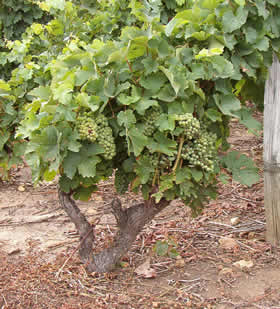
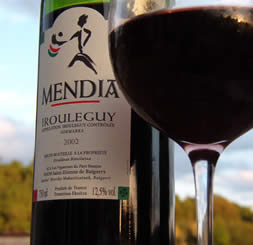 Irouleguy,
again. I'm beginning to like this appellation. Managed to find one in
a Geant hypermarket for 4.75 Euros, and it's a cracker (right).
It has lovely, savoury structure with fruit, but a whole lot besides -
plenty of minerality, in particular, that ill-defined component of
wine. This is from the same producer as the one mentioned two blog
entries below. If France can produce fantastic wines like this and
sell them for under five Euros, its wine industry shouldn't be in the
difficulties it is currently experiencing. These sorts of wines need
an access to market in the UK without the sort of price hike that
doubles or trebles the Euro price to the consumer. Other wines
enjoyed include a cheap Picpoul de Pinet, a full bodied Gaillac (a
consistent appellation in my experience) and a well behaved Madiran.
Irouleguy,
again. I'm beginning to like this appellation. Managed to find one in
a Geant hypermarket for 4.75 Euros, and it's a cracker (right).
It has lovely, savoury structure with fruit, but a whole lot besides -
plenty of minerality, in particular, that ill-defined component of
wine. This is from the same producer as the one mentioned two blog
entries below. If France can produce fantastic wines like this and
sell them for under five Euros, its wine industry shouldn't be in the
difficulties it is currently experiencing. These sorts of wines need
an access to market in the UK without the sort of price hike that
doubles or trebles the Euro price to the consumer. Other wines
enjoyed include a cheap Picpoul de Pinet, a full bodied Gaillac (a
consistent appellation in my experience) and a well behaved Madiran. 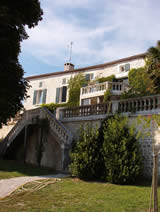 I'm
in France. Staying in a gorgeous house in the Charente with two other
couples and their nippers. The house belongs to relatives, and it's
fantastic, with a nice pool and a decent tennis court. We've drunk a
lot of good cheap wine, something France can do very well. Why is it
then that it's so hard to find decent cheap French wine in the UK?
We've drunk a couple of nice Gaillacs (cheap as you like with robust,
savoury fruit), some Fronton (hmmm, meaty....nice), a couple of
delicious Touraine Sauvignons and a voluptuous Sauternes (Castelnau de
Suduiraut 2000, a bit of a snip at 11 euros). The weather is looking
a bit dodgy at the moment, but I'm confident that we'll soon be back
in the pool. Who knows - I might take a trip out to Bordeaux to gawp
at some vines. Book progress is good. If anyone out there has some
nice pictures that I can use - on any wine science-type issues - then
send them in. I've got quite a few already, but seeing as my contract
stipulates that I have to pay any fees for using pictures out of my
royalties, I'm quite keen not to make extensive use of picture
libraries.
I'm
in France. Staying in a gorgeous house in the Charente with two other
couples and their nippers. The house belongs to relatives, and it's
fantastic, with a nice pool and a decent tennis court. We've drunk a
lot of good cheap wine, something France can do very well. Why is it
then that it's so hard to find decent cheap French wine in the UK?
We've drunk a couple of nice Gaillacs (cheap as you like with robust,
savoury fruit), some Fronton (hmmm, meaty....nice), a couple of
delicious Touraine Sauvignons and a voluptuous Sauternes (Castelnau de
Suduiraut 2000, a bit of a snip at 11 euros). The weather is looking
a bit dodgy at the moment, but I'm confident that we'll soon be back
in the pool. Who knows - I might take a trip out to Bordeaux to gawp
at some vines. Book progress is good. If anyone out there has some
nice pictures that I can use - on any wine science-type issues - then
send them in. I've got quite a few already, but seeing as my contract
stipulates that I have to pay any fees for using pictures out of my
royalties, I'm quite keen not to make extensive use of picture
libraries. 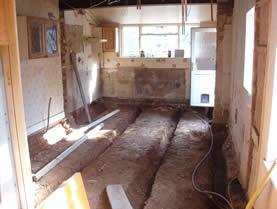
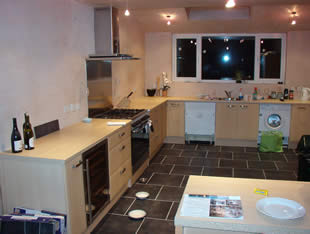
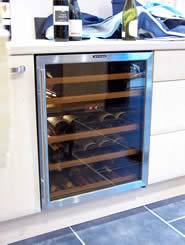 I've
been stocking my Vintec unit, now the kitchen is almost finished (in
the picture you can see we've still got to integrate the appliances
and paint the walls, adding a splashback). It has room for 44 bottles.
For any self-respecting wine nut this sort of capacity is filled
without any effort. I have realized I've got some nice bottles. The
idea behind this sort of unit is that you store stuff for near-term-ish
consumption, whilst keeping the rest in storage. From my perspective,
six bottle cases are ideal: you can then pull them out and drink them
over a period where cabinet storage is going to be a realistic option.
Pull a couple of 12-bottle cases and you'll soon be stretching your
cabinet capacity unless you polish them all off fairly rapidly. I've
almost stopped buying wine because I buy faster than I drink, and I
can't really drink any more without running into difficulties. But I
can buy less.
I've
been stocking my Vintec unit, now the kitchen is almost finished (in
the picture you can see we've still got to integrate the appliances
and paint the walls, adding a splashback). It has room for 44 bottles.
For any self-respecting wine nut this sort of capacity is filled
without any effort. I have realized I've got some nice bottles. The
idea behind this sort of unit is that you store stuff for near-term-ish
consumption, whilst keeping the rest in storage. From my perspective,
six bottle cases are ideal: you can then pull them out and drink them
over a period where cabinet storage is going to be a realistic option.
Pull a couple of 12-bottle cases and you'll soon be stretching your
cabinet capacity unless you polish them all off fairly rapidly. I've
almost stopped buying wine because I buy faster than I drink, and I
can't really drink any more without running into difficulties. But I
can buy less.  Fiona
(pictured right) has decided she's not 'into' Australian Chardonnay
any more. Or any Chardonnay, for that matter, unless it doesn't really
taste like Chardonnay (I'm sure she'd still knock back high-end white
Burgundy). Our house white is therefore Torres Vina Sol, which is
wonderfully fresh, a little bit aromatic, and a perfect match for a
wide range of foods. At under £5 a bottle, little comes close. We
also like Aussie Riesling, fresh Semillons and less extreme Sauvignon
Blancs. There's lots of pretty good cheap white wine around at the
moment, as long as you avoid the cheap Chardonnays.
Fiona
(pictured right) has decided she's not 'into' Australian Chardonnay
any more. Or any Chardonnay, for that matter, unless it doesn't really
taste like Chardonnay (I'm sure she'd still knock back high-end white
Burgundy). Our house white is therefore Torres Vina Sol, which is
wonderfully fresh, a little bit aromatic, and a perfect match for a
wide range of foods. At under £5 a bottle, little comes close. We
also like Aussie Riesling, fresh Semillons and less extreme Sauvignon
Blancs. There's lots of pretty good cheap white wine around at the
moment, as long as you avoid the cheap Chardonnays. 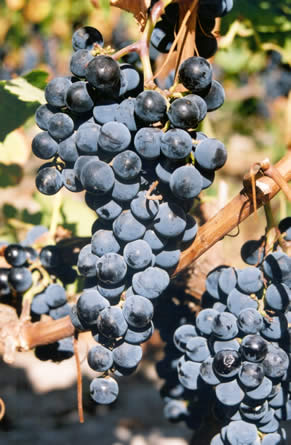 One
of my hobbies is messing around with vines. Englandís a cold, wet
place to grow grapes, but if you choose you varieties carefully you
can get decent results in all but the most wretched summers. Over the
last three years Iíve learned a lot about the grapevine. Times are a
changing in the world of wine: previously winemakers got all the
glory; now the mantra is that wine is made in the vineyard (I wish I
had a case of decent wine for every time I heard a winegrower lean
over to me, look me in the eyes and say in hushed tones Ė as if she
or he were sharing a profound and unique truth with me, ĎWe believe
that wine is made in the vineyardí, because then my cellar would be
huge). My point is, soon we may be seeing superstar viticulturalists
flying the globe (and not just Richard Smart). Compared with
viticulture, winemaking is relatively easy.
One
of my hobbies is messing around with vines. Englandís a cold, wet
place to grow grapes, but if you choose you varieties carefully you
can get decent results in all but the most wretched summers. Over the
last three years Iíve learned a lot about the grapevine. Times are a
changing in the world of wine: previously winemakers got all the
glory; now the mantra is that wine is made in the vineyard (I wish I
had a case of decent wine for every time I heard a winegrower lean
over to me, look me in the eyes and say in hushed tones Ė as if she
or he were sharing a profound and unique truth with me, ĎWe believe
that wine is made in the vineyardí, because then my cellar would be
huge). My point is, soon we may be seeing superstar viticulturalists
flying the globe (and not just Richard Smart). Compared with
viticulture, winemaking is relatively easy. 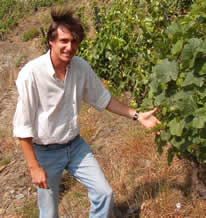 Watching
the game I drank something Portuguese, and something special. It was
Poeira 2002. I've already written about Jorge Moreira's wine before.
Previously winemaker with Real Compania Velha, he's now working
wonders at Quinta de la Rosa. His own wine is, in my opinion, one of
Portugal's very best, and the inaugural vintage was 2001. 2002 is a
little less showy on opening but has more structure and depth to it.
It's elegant, concentrated and fully integrated, made in a style
that's designed to improve in bottle. Most of all, I feel it's an
authentic wine: not showing off or dressed up with oak and sweet
fruit. Unfortunately, there's none available for the UK: I hope this
will change.
Watching
the game I drank something Portuguese, and something special. It was
Poeira 2002. I've already written about Jorge Moreira's wine before.
Previously winemaker with Real Compania Velha, he's now working
wonders at Quinta de la Rosa. His own wine is, in my opinion, one of
Portugal's very best, and the inaugural vintage was 2001. 2002 is a
little less showy on opening but has more structure and depth to it.
It's elegant, concentrated and fully integrated, made in a style
that's designed to improve in bottle. Most of all, I feel it's an
authentic wine: not showing off or dressed up with oak and sweet
fruit. Unfortunately, there's none available for the UK: I hope this
will change.  They
are package holidays for the well heeled. The lure for us was (1) they
were running some very substantial discounts for June, bringing them
into the range of the likes of us; (2) the fact that the kids are
looked after from 9 am-1 pm and then 3 pm - 5.30 by a band of nannies
running event-filled kids clubs; and (3) the sailing. I used to sail
quite a bit, and took four or five holidays on the Norfolk Broads with
mates. But this was dingy sailing, on Picos, Fevas and Lasers. I had
to learn to sail all over again in the little, responsive, easily
capsized dingys. Never was journeying without a purpose such
fun.
They
are package holidays for the well heeled. The lure for us was (1) they
were running some very substantial discounts for June, bringing them
into the range of the likes of us; (2) the fact that the kids are
looked after from 9 am-1 pm and then 3 pm - 5.30 by a band of nannies
running event-filled kids clubs; and (3) the sailing. I used to sail
quite a bit, and took four or five holidays on the Norfolk Broads with
mates. But this was dingy sailing, on Picos, Fevas and Lasers. I had
to learn to sail all over again in the little, responsive, easily
capsized dingys. Never was journeying without a purpose such
fun.